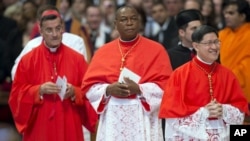Pope Benedict has formally appointed six new cardinals from around the world to serve in an elite group of prelates who will one day select a new pontiff.
The six newest members of the Vatican's College of Cardinals come from Colombia, India, Lebanon, Nigeria, the Philippines and the United States.
During Saturday's ceremony -- called a "consistory" -- the 85-year-old pope said he wanted to emphasize that the Roman Catholic Church is inclusive.
"It presents a variety of faces, because it expresses the face of the universal Church," Benedict said. "In this Consistory, I want to highlight in particular the fact that the Church is the Church of all peoples, and so she speaks in the various cultures of the different continents amid the polyphony of the various voices, she raises a single harmonious song to the living God.''
Last month's naming of the new cardinals came after critics expressed concern that the body to elect the future pope was too eurocentric. When Pope Benedict elevated 22 cardinals in February, the vast majority of them were European archbishops and Vatican bureaucrats.
Cardinals serve as the pope's closest aides, but their main job is to elect a new pope. Even with the new additions, out of 120 cardinals under age 80 and therefore eligible to vote, 62 are European.
Elevating the new "princes of the Church" at St. Peter's Basilica, the pope gave them their gold rings and traditional red hats, or "birettas." He told them that the scarlet color they wear symbolizes the blood they must be willing to shed to remain faithful to the Church.
Benedict has now named 67 of the cardinals who will elect his successor from within their own ranks.
Among the new cardinals are American James Michael Harvey, Prefect of the Pontificial House, who will be appointed Archpriest of the Basilica of St. Paul Outside the Walls. The other cardinals include Bechara Boutros Rai of Lebanon, Patriarch of Antioch of the Maronites; India's Baselios Cleemis Thottunkal, Major Archbishop of Trivandrum of the Syro-Malankara; John Olorunfemi Onaiyekan, Archbishop of Abuja, Nigeria; Ruben Salazar Gomez, Archbishop of Bogota, Colombia; and Luis Antonio Tagle, Archbishop of Manila, Philippines.
The six newest members of the Vatican's College of Cardinals come from Colombia, India, Lebanon, Nigeria, the Philippines and the United States.
During Saturday's ceremony -- called a "consistory" -- the 85-year-old pope said he wanted to emphasize that the Roman Catholic Church is inclusive.
"It presents a variety of faces, because it expresses the face of the universal Church," Benedict said. "In this Consistory, I want to highlight in particular the fact that the Church is the Church of all peoples, and so she speaks in the various cultures of the different continents amid the polyphony of the various voices, she raises a single harmonious song to the living God.''
Last month's naming of the new cardinals came after critics expressed concern that the body to elect the future pope was too eurocentric. When Pope Benedict elevated 22 cardinals in February, the vast majority of them were European archbishops and Vatican bureaucrats.
Cardinals serve as the pope's closest aides, but their main job is to elect a new pope. Even with the new additions, out of 120 cardinals under age 80 and therefore eligible to vote, 62 are European.
Elevating the new "princes of the Church" at St. Peter's Basilica, the pope gave them their gold rings and traditional red hats, or "birettas." He told them that the scarlet color they wear symbolizes the blood they must be willing to shed to remain faithful to the Church.
Benedict has now named 67 of the cardinals who will elect his successor from within their own ranks.
Among the new cardinals are American James Michael Harvey, Prefect of the Pontificial House, who will be appointed Archpriest of the Basilica of St. Paul Outside the Walls. The other cardinals include Bechara Boutros Rai of Lebanon, Patriarch of Antioch of the Maronites; India's Baselios Cleemis Thottunkal, Major Archbishop of Trivandrum of the Syro-Malankara; John Olorunfemi Onaiyekan, Archbishop of Abuja, Nigeria; Ruben Salazar Gomez, Archbishop of Bogota, Colombia; and Luis Antonio Tagle, Archbishop of Manila, Philippines.





